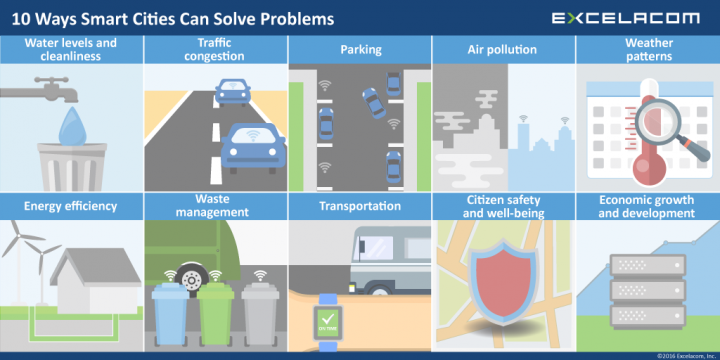Are You Ready for the Smart City Evolution?
Your phone isn't the only thing that's smart. With the majority of the world's population residing in urban areas, it is becoming more and more crucial for cities to become "smart." In 1950, only 30% of the world's population was living in urban areas, growing to 54% in 2014 and by 2020, it's expected to reach 66% (United Nations). To adequately support our rapidly growing urban population and economy, we need to continue to heavily invest in the development of smart cities.
What are Smart Cities?
Slowly, but surely, smart cities are becoming reality and are beginning to modify existing urban environments. Imagine that your city can talk to you, tell you which route to take to work, which route to avoid, where to park your car, etc. The purpose of a smart city is to promote a sustainable environment, ensuring its citizens remain constantly informed, safe and live a quality life. In September of 2015, the U.S. government announced that they plan to invest over $160 million in federal research for the new "Smart Cities" Initiative.

How Smart Cities Can Solve Problems
Every major city is unique in its own way, but each deal with many of the same, if not very similar problems. The following list contains 10 major obstacles faced in many urban areas around the world today that can be solved, or significantly improved through the development of smart cities.
- Water levels and cleanliness. While American's waste 1 trillion gallons of water each year (The Washington Post), 1 in 10 people around the world do not have access to safe water and every 90 seconds a child dies from a water-related disease (Water.org). These numbers are nothing but disturbing. To prevent this, cities need adopt smart technologies such as smart meters and sensors that provide real-time data, which ultimately reduce water waste and ensure citizens are drinking safe, clean water.
- Traffic congestion. Cities can smooth traffic flows by investing in cameras, sensors and applications so that traffic is visible in real-time and therefore can be better managed and controlled by authorities. This will result in more efficient traffic flows, safer roads, less congestion, less pollution and better operational decision making (Cisco).
- Parking. Approximately 30% of traffic in cities is caused by people who are simply looking for parking. With the use of cameras, sensors and applications, both drivers and the city will benefit. Drivers can be guided to parking spots though voice automation and pay for spaces through their mobile phones. Authorities can effortlessly discover parking violations through the use of video and then issue tickets, increasing revenue for the city (Cisco).
- Air Pollution. Annually, over 1 billion people are exposed to air pollution and urban air pollution has been directly linked to over 2 million deaths (UNEP). By putting smart technologies and data to use, we can save, improve and elongate billions of lives worldwide. Cities need to invest in monitoring systems and sensors in order to manage air quality so the government and its citizens can remain conscious and informed of the air they are breathing.
- Weather patterns. Smart cities need to adopt smart technologies such as data information systems, radars, satellites, etc. for weather management purposes to be notified in advance of extreme weather conditions such as flooding, droughts and intense storms. This system will allow the appropriate personnel to act quick, helping with operational decision making during these severe conditions (Schneider Electric).
- Energy efficiency. Cities account for 75% of the energy consumed worldwide. Cities need to be more sustainable and can start by having tighter control on their energy consumption. For instance, smart grids, smart meters, robots, sensors, controlled LED lighting can track energy consumption in real-time and have the ability to connect to relevant equipment, buildings, factories, vehicles, devices, etc. (The Guardian).
- Waste management. More people means more garbage. The total waste volume generated globally is predicted to double within the next decade (Smart Cities Council). For our current waste management system to be more efficient we need to integrate a system that facilitates the logistics. With the proper system in place, truck routes can be monitored, optimized and better controlled based on the fill level of waste containers.
- Transportation. One of the biggest challenges cities face is integrating all modes of transportation so that its citizens can travel quickly, efficiently, conveniently and safely throughout a "green" system. Connecting mobile phones to all transportation modes will help commuters get where they want, when they want, ultimately saving them both time and money (UITP).
- Citizen's safety and well-being. Keeping citizens safe from crime and terrorism is crucial. Integrating smart technology will help law enforcement officials collect data, analyze patterns and more quickly discover incidents or suspects. By incorporating smart technology into cities and citizens' everyday lives, their quality of life and well-being will instantly be improved. They will feel safer, more engaged, informed and constantly aware of their environment (Cisco).
- Economic growth and development. Integrating smart technologies will benefit cities in a countless amount of ways, such as, improving city operations, protecting their natural resources, reducing consumption, increasing sustainability and better serve its citizens. Ultimately, revenue will grow and costs will be dramatically reduced.
Service Providers Role in Smart Cities
The smart city market has potential to increase to $1.5 trillion worldwide. With most cities still in the infancy phase (61.2%), still researching and exploring the possibilities of transforming themselves into a smart city, it leaves enormous opportunities for service providers (Cronos Group).
As these smart cities evolve, they will demand more and more speed and connectivity to communication networks to support their growing infrastructures.
For more information on how you can be a leader in the development of smart cities, please contact Excelacom at marketing@excelacom.com.
